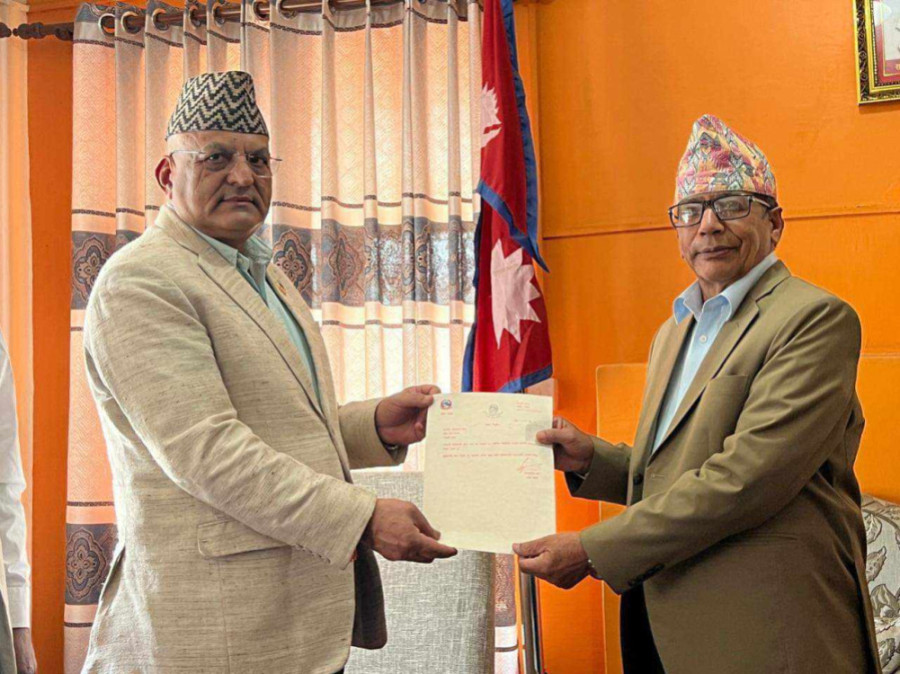Politics
Pandey is Gandaki chief minister again after court order
Surendra Pandey’s party, Nepali Congress, has just 27 seats in the 60-strong provincial assembly.
Purushottam Poudel
With the appointment of Surendra Pandey, the parliamentary party leader of the Nepali Congress, as the chief minister of Gandaki on Wednesday, the province has formed its fourth government in a year and a half since the 2022 general elections.
Province Head Dilliraj Bhatta appointed Pandey as the chief minister. Besides, Bindukumari Thapa and Takraj Gurung of the Congress have been appointed ministers. Thapa has been made the minister for Social Development and Energy whereas Gurung takes on the role of minister for finance.
Pandey was sworn in on Wednesday in accordance with Article 168 (3) of the constitution after the Supreme Court on Monday declared the vote of confidence obtained by Chief Minister Khagaraj Adhikari of the CPN-UML unconstitutional. It also issued a mandamus order to appoint Pandey, the provincial parliamentary party leader of the Congress, as the new chief minister within 48 hours of the order.
In 2023, Pandey unseated Adhikari, who had formed the government on December 25, 2022.
As no party has a clear majority in the 60-strong assembly, the stability of the Pandey government is uncertain. Since Adhikari lost the chief ministerial berth after falling short of just one vote in the assembly, the same thing may happen with Pandey as well.
Earlier, on March 4, after a realignment in federal coalition partners, when the UML and the Maoist Centre came together to form the government, ousting the Congress from the government, its implications were seen in the provinces, most visibly in Gandaki.
Adhikari, who was appointed the chief minister, went for the floor test on May 5. In spite of support from 30 assembly members, including Speaker Krishna Prasad Dhital, Adhikari was declared the chief minister. However, Pandey, who was the chief minister of the province until Adhikari took over his position, challenged Adhikari’s appointment in the Supreme Court.
The court ruled that the 30 votes the chief minister received were insufficient to win the provincial lawmakers’ trust, stating that 31 votes should be obtained to command a majority in the assembly.
However, with the largest party—the Congress—having 27 seats in the provincial assembly, the government's stability hangs in the balance. The party must secure the support of four more assembly members to ensure a stable government.
The UML has 22 members in the assembly, whereas the CPN (Maoist Centre) has eight. As both are partners in the federal ruling alliance, they are unlikely to support Chief Minister Pandey in normal circumstances.
However, the Congress assembly members are optimistic about the government's stability. They expect the support of two members from the Rastriya Prajantra Party (RPP), independent assembly member Rajiv Gurung and Phanindra Devkota, a lawmaker of the Nepal Samajbadi Party who fought the 2022 election using the Maoist Centre’s symbol.
“We don’t have any confusion over the government’s stability,” Dilliram Subedi, a Congress member, told the Post. “To secure a majority in the assembly, our party is in talks with the RPP and the other two members. The party is confident of securing a majority during the trust vote.”
However, the RPP assembly members are looking forward to negotiations before supporting Pandey as the chief minister. The RPP, which submitted a 40-point demand to Prime Minister Pushpa Kamal Dahal in February, wants a commitment from Pandey and his Congress party before it gives him the vote of confidence.
“For now, our party has decided to remain in the opposition,” Pancharam Gurung, a RPP assembly member, told the Post. “Whether or not our party supports the government will be determined by the way the Congress approaches us. ”
The party's demand submitted to Prime Minister Dahal mentions reinstating constitutional monarchy as a ‘guardian of the state’, scrapping the provincial component of the federation, and keeping only two tiers of government, among other things.
The Congress leaders say the political scenario will be in Pandey’s favour by the time the new chief minister goes for a floor test. Pandey should do so within 30 days of his appointment as the chief minister, i.e. June 27, as per Article 168 (4) of the Constitution.
Although Congress leaders expect a vote of confidence from Devkota, he has not decided on the matter. “Whether I will vote in favour of Chief Minister Pandey will depend on how the political situation unfolds,” Devkota told the Post. “However, I won’t be the cause for political instability in the province.”
Devkota could also face a legal challenge if he supports Chief Minister Pandey. “Devkota contested the election using our party’s symbol. Therefore, he will be legally bound to follow our party’s whip,” says Hari Bahadur Chuman, the parliamentary party leader of the Maoist Centre in Gandaki Province.
“We believe Phanindra Devkota will adhere to the party whip and won’t cross the floor,” Chuman told the Post. “If he does, we will take action against him.”
But Devkota contests Chuman’s argument. “I am affiliated with the Nepal Samajbadi Party, which means I am not bound by the whip of the Maoist Centre.”
Generally, the party's parliamentary committee looks after its parliamentary activities. The party decides whether to take action against someone who contested the election using the party emblem for crossing the floor.
“But if a complaint is lodged against someone for violating the party’s whip, the Election Commission can take action against them,” Ram Datta Pandey, deputy spokesperson for the Election Commission, told the Post. “Action could go as far as nullifying the assembly membership.”




 10.12°C Kathmandu
10.12°C Kathmandu















